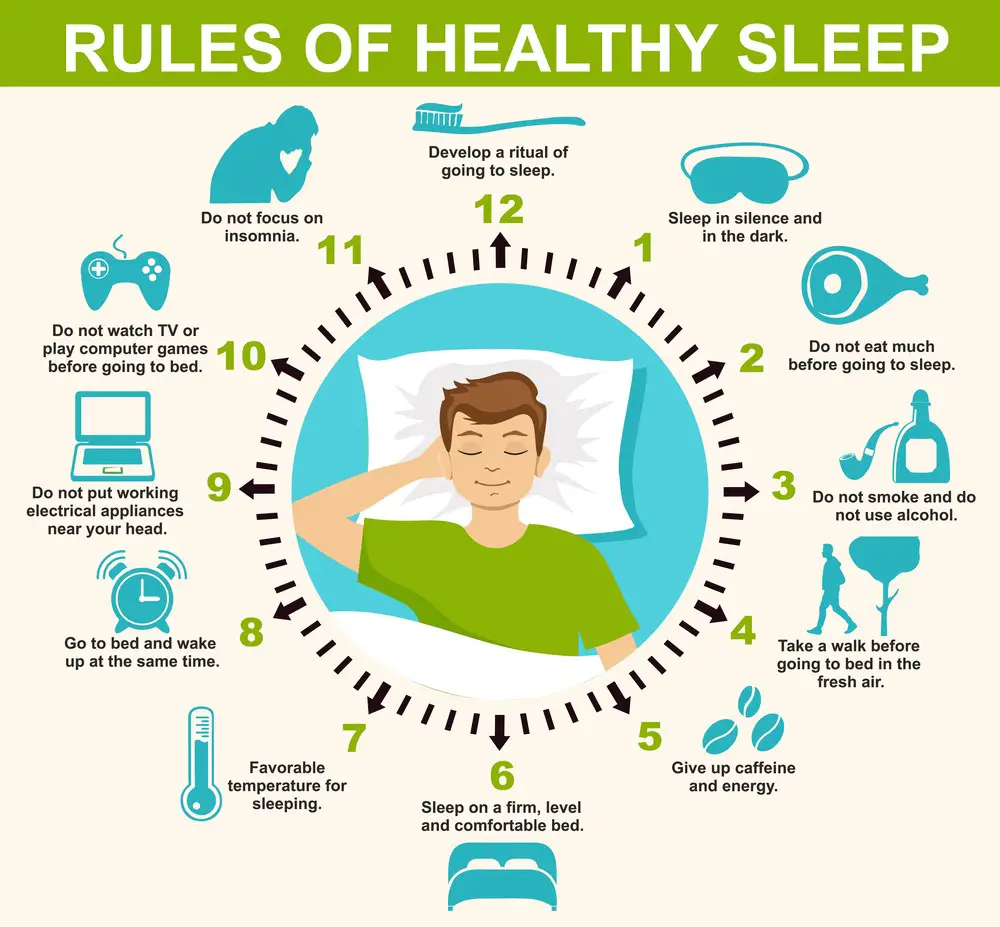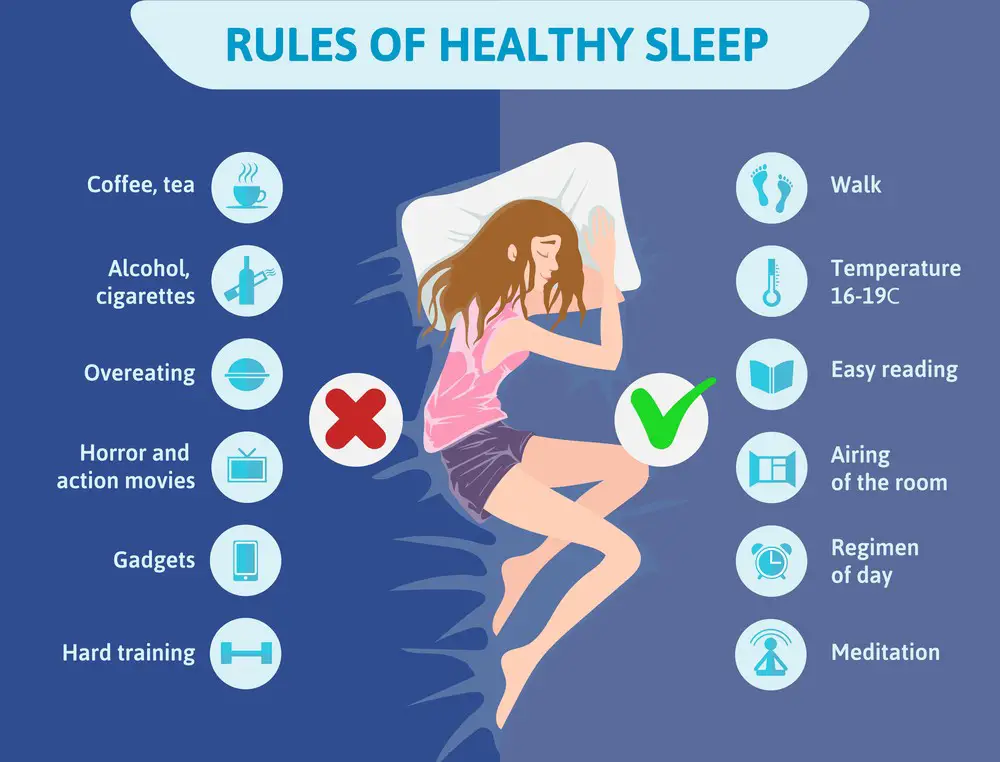As a BetterHelp affiliate, we receive compensation from BetterHelp if you purchase products or services through the links provided
There’s nothing worse than lying in bed, unable to fall asleep. You toss and turn for what seems like hours before finally giving up and turning on the light. If this sounds all too familiar, then keep reading – we’re going to share 10 tips for falling asleep peacefully every night. By following these guidelines, you’ll be able to get the rest you need and wake up feeling refreshed and ready to take on the day.
So let’s get started!

Importance of Achieving Peaceful Sleep
Most people know that getting enough sleep is essential, but they don’t understand why. For starters, sleep helps to heal and repair our bodies. During sleep, our cells produce more protein to help us recover from the day’s activities. Sleep also gives our brains a chance to rest and recharge. While we sleep, our brains consolidate memories and process information from the day.
Sleep also helps regulate our moods and improve our ability to cope with stress. When well-rested, we’re better able to manage difficult emotions and situations.
It is essential for physical health. Lack of sleep can increase the risk of chronic conditions such as obesity, heart disease, and diabetes.

1. Exercise regularly before bed
Most of us know that exercise is good for our health, but did you know that it can also help you sleep better at night? That’s right – regular exercise can help promote a healthy sleep cycle by releasing endorphins, mood-boosting hormones that promote relaxation.
However, it’s essential to choose an activity that is moderate in intensity, as too much activity can stimulate your brain and make it more difficult to fall asleep. For example, taking a leisurely walk around the block before bed can be a great way to wind down after a long day and prepare for a good night’s rest.
2. Make sure your bedroom is dark and quiet
A good night’s sleep is essential for overall health and well-being, yet many people struggle to get enough restful sleep regularly. Several factors can contribute to insomnia or disrupted sleep patterns, but one of the most common is exposure to light and noise.
To create an environment conducive to sleep, it is vital to ensure your bedroom is dark and quiet. Blackout curtains can help to block out light from outside sources, while earplugs or an eye mask can help to reduce noise levels.
It is advisable to avoid gadgets in the hour before bedtime to create a peaceful and relaxing atmosphere. These simple steps allow you to sleep peacefully and wake up feeling refreshed.
3. Establish a regular sleep schedule
A regular sleep schedule is essential for anyone who wants to sleep peacefully. It can be helpful to establish an 8-hour window for sleeping and to stick to it as closely as possible. This means going to bed and waking up at the same time each day, even on weekends.
It’s also essential to ensure that your sleep schedule works for you. Everyone is different; some people need more or less sleep than others. But as long as you’re getting enough rest, a regular sleep schedule can help you sleep more deeply and feel well-rested.
4. Try not to stress out about sleeping
For many people, sleep is a very precious commodity. And when you don’t get enough of it, it can be easy to start to stress out about it. But you can do a few things to try and sleep peacefully every night.
Get comfortable in your skin – accepting that there’s nothing wrong with being anxious about sleeping is the first step towards a peaceful slumber every night! And get comfortable in your sleeping environment – choosing the right pillow and sheets can make all the difference!
5. Get rid of electronic devices in your bedroom
It’s no secret that screens can be detrimental to sleep. The blue light emitted by devices suppresses the production of melatonin, the hormone that helps regulate sleep. As a result, looking at a screen before bed can make it harder to fall asleep and lead to poorer sleep quality.
Furthermore, devices can be distracting, making it difficult to wind down before bed.
For these reasons, it’s important to keep electronics out of the bedroom. One way to do this is by setting a time limit for devices before bedtime. You can replace them with books, candles, or noise-canceling headphones to block out the outside world and help you sleep peacefully.
6. Make your bed comfortable
Creating a peaceful and comfortable sleep environment can help promote better sleep. Make your bed as comfortable as possible by choosing a firm but supportive mattress and pillow. Add a pillow, blanket, and sheets that are cozy and inviting. Dim the lights before you sleep and avoid watching TV in bed. Create a relaxing ambiance in the bedroom by using aromatherapy candles, scents, or music players with calming soundtracks.
7. Take a cool bath before bed
There’s nothing quite like a relaxing bath before bed to help you drift off into a peaceful sleep. Adding Epsom salts to the bathwater can help reduce inflammation throughout the body, relieving aches and pains that can keep you awake at night. The soothing scent of lavender or chamomile can also help to quiet your mind and prepare you for a good night’s sleep.
8. Avoid caffeine, alcohol, and cigarettes before bed
Did you know that smoking cigarettes can interfere with your sleep? Cigarettes contain nicotine, a stimulant that increases alertness and raises your heart rate. This makes it more challenging to relax and fall asleep. So if you’re looking for a good night’s sleep, it’s best to avoid cigarettes altogether. You should also avoid caffeine and alcohol before bed, as they can interfere with sleep. Instead, try relaxation techniques like meditation or yoga to help you sleep peacefully.
9. Meditation and relaxation techniques
If you’re struggling to sleep peacefully through the night, you may want to try some relaxation techniques. Meditation and deep breathing can help to clear your mind and relax your body, making it easier to fall asleep. You may also want to try some gentle yoga or massages before bed.
Experiment with different techniques until you find something that works well for you. With a little effort, you’ll be able to sleep peacefully in no time.
10. Keep a cool bedroom environment
You can take several steps to create an optimal sleep environment in your bedroom.
Keep your room cool and dark. Studies have shown that temperature plays a role in sleep quality, so keep your bedroom around 68 degrees at night.
Use a fan to circulate air throughout the room. This will help you avoid stuffiness and create a refreshing environment for sleep.
Sleep Peacefully With These Tips: In Summary
A good night’s sleep is essential for our physical and mental health. Unfortunately, falling asleep can be a real challenge for many of us.
If you’re struggling to catch some Z’s, don’t stress – there are a few simple things you can do to get your sleep schedule back on track. Create an environment that is cool, comfortable, and free from distractions to help your body relax and prepare for sleep. Establish a regular sleep schedule by going to bed and waking up at the same time each day, and stay consistent each night!
Different techniques will work better for some people, so find your routine and stick with it. With a little effort, you’ll be sleeping peacefully in no time.
- How to Transform a Home’s Patio Space into a Relaxing Space - March 23, 2025
- 5 Strategies to Use a Cell Phone to Help Manage Your Stress - March 23, 2025
- 4 Ways to Use Measurements to Create a Relaxing Sleep Space - March 23, 2025
This site contains affiliate links to products. We will receive a commission for purchases made through these links.



